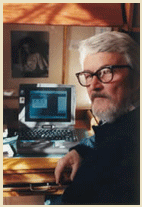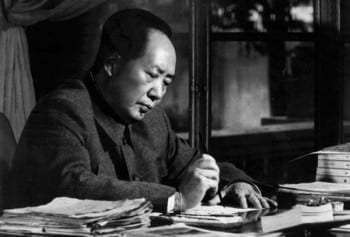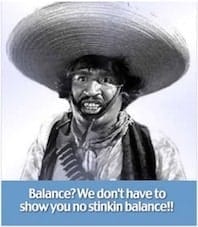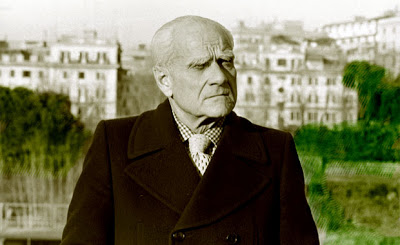The best way to get around the internet censors and make sure you see the stuff we publish is to subscribe to the mailing list for our website, which will get you an email notification for everything we publish.
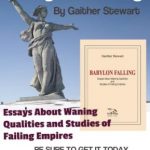
 This work is licensed under a Creative Commons Attribution-NonCommercial 4.0 International License.
This work is licensed under a Creative Commons Attribution-NonCommercial 4.0 International License.
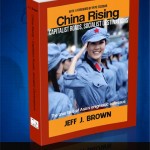
Moti Nissani reviews Jeff Brown’s latest tour de force
China Rising: Capitalist Roads, Socialist Destinations [Print Replica] Kindle Edition
by Jeff J. Brown (Author) / 719 pp Kindle edition
By Dr. Moti Nissani, Professor Emeritus, Wayne State University
![]()
Jeff Brown’s book, China Rising: Capitalist Roads, Socialist Destinations, helped me close that gap.
For one thing, Brown is fluent in Mandarin and was thus able to rely on both external and internal perspectives to construct his narrative. Brown has also lived and worked, in “the belly of the beast” for 13 years. As well, Brown travelled extensively in China, an experience recounted in his 2013 book, 44 Days Backpacking in China. He is at home in China, America, France, and North Africa, and is thus poised to give a multicultural inside look into Chinese society, politics, and culture.
Brown writes passionately, from the heart, and does not hesitate to unmask powerful scoundrels. He obviously finds many things to admire about China, and feels that it, along with Russia, provides our best hope for a better world and for escaping the hypocritical tyranny of the Western Princes of Power (his name for the Controllers of the Invisible Government). And yet his reporting is objective, often balancing the pluses and minuses of Baba Beijing (Father Beijing—Brown’s nickname for the benevolently-authoritarian Chinese government).
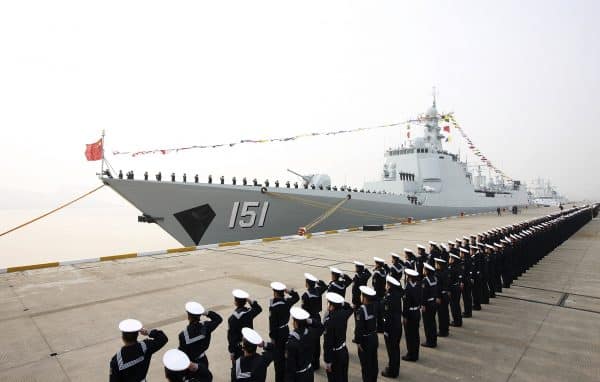
In this Thursday, Dec. 26, 2013 photo, Chinese People’s Liberation Army navy personnel salute in front of a new Type 052C guided missile destroyer Zhengzhou during its commission ceremony in Zhoushan, in eastern China’s Zhejiang province. China has made enormous sacrifices to buttress her military and defend her sovereignty, the only deterrent the West understands. Contrary to the Western mindset, China has no interest in becoming an imperialist power. (AP Photo)
China Rising consists of three interwoven parts, each complementing and reinforcing the other: The USA and the West, Chinese politics and culture, and the joys and frustrations of living in China.
Brown rightly insists that to understand China, we must understand the West and, in particular, Brown’s home country, the USA. He forcefully reminds us of America’s rigged elections, corrupt political culture, and sunshine bribery. The real controllers of the USA, he rightly observes, are not its titular leaders but the Princes of Power. These Princes do not shy away from assassinations, from viciously and needlessly impoverishing and enslaving their own people, from scandalously contaminating our information sources, and from risking all of our lives with their reckless nuclear brinkmanship.

Obama’s coyly named “Pivot to Asia” is nothing but Washington’s effort to contain China’s natural influence in regional and world affairs. Besides stirring up trouble in the South China Sea, the US is actively enlisting Japan in this new aggressive alliance and pushing for a re-emergence of Japanese militarism. (PHOTO: Obama and Japan’s rightwing PM, Shinzo Abe.)
One of the most touching parts of the book is Brown’s own gradual awakening to the Machiavellian realities of American policies at home and abroad. Here is one passionate description of one landmark in his painful journey:
“Then I read articles about how the United States duped Saddam Hussein into seizing Kuwait, as a pretext to invade his country. The entire text of Saddam’s meeting with US Ambassador to Iraq, April Gillespie, has since been released . For all intents and purposes, Ms. Gillespie gave Mr. Hussein the green light to invade Kuwait. It’s a diplomatic version of Paul Newman’s and Robert Redford’s film, The Sting. Again, there was this angst in my soul, a terrible cognitive dissonance between all the perfection and self-sacrifice that Uncle Sam has supposedly nobly committed himself to, and upon which I was nurtured, versus this glaring evidence to the contrary.”
Brown recalls a few more snippets of information that Western teachers, textbooks, movies, and media conveniently forget. World War I, Brown observes, was “essentially an extremely deadly slaughter between feuding colonial powers, who were out to control as much of the world’s dark-skinned peoples and their natural resources.”

Smedley Darlington Butler was a United States Marine Corps major general, the highest rank authorized at that time, and at the time of his death the most decorated Marine in U.S. history. After decades of service, Butler realized what he had done—”served as muscle for the Wall Street boys”, and became outspoken in his denunciations of imperialism. His integrity remains a moral example for others to follow.
“All the American soldiers in Latin America, from Smedley Butler on down, were taxpayer-funded thugs for Wall Street, pure and simple. Not protecting the home front, not maintaining Americans’ freedoms, and not making the world a safer place for democracy.”
“France lost 5% of its population during World War I, a pointless slaughter between greedy, Western colonialists. Ireland lost 15% of its people during the British-legislated Great Potato Famine Genocide 1845-1853. French colonialists in Vietnam, in a terrible drought, forced two million to starve to death in 1945, which was 9% of the local population. The United States massacred 7% of the Filipinos, starting in 1898, when it colonized that island country. More recently, the United States killed 3.3 million Iraqis, 1990-2012, including 750,000 children, the total which represents almost 19% of the population.”
“Most Chinese know their information is censored. Most Westerners obediently believe they have “freedom of the press” and that censorship is everybody else’s problem. Sadly, Westerners are deluded, gullible and easily manipulated. But this has been true of all citizens of Empire, since the dawn of civilization.”
“America’s prison population in a supposedly democratic country is increasing exponentially; in autocratic China, it’s going down. Another geopolitical irony.”
The part that captivated me most about China Rising was—China itself.
“The Chinese understand history much better than Westerners. They will never forget their century of humiliation, 1840-1949, when the UK and the US engaged in what is called, ‘the longest running and largest global criminal enterprise in world history’ – enslaving the Chinese people with opium. They, along with the European colonial powers, then proceeded to cart off the nation’s silver bullion and rob it of its agricultural, mineral, forest and human resources.”
On my first arrival in China, I remember my dismay seeing photos of Mao Zedong everywhere. China Rising offers an explanation.As a result of bad decisions of China’s rulers and century long-brutal colonial exploitation, by “1949, China was basically a 19th century hellhole,” with 100 million opium addicts, people on average died at age 35. After coming to power in 1949, Mao “eradicated opium use and cultivation, prostitution, child slavery, child trafficking and feet binding in only two years, saving many tens of millions of lives and improving the lives of hundreds of millions more. They also wiped out war lords, organized crime, gangsters, gambling, loan sharking, drugs, gun running and the protection rackets in the same record time. This is unprecedented in such a short period of time, especially with such a vast population. All this alone transformed the lives of the Chinese from misery and exploitation to hope and security.”
Now literacy is almost 100%, and longevity 76 years. Above all, Mao liberated China “from the horror of being a western whore.”
We hear much from Western presstitutes about China’s environmental woes—and little about our own, or the environmental horrors of countries under the Princes’ control. Nor do the Western media bother to tell us about the progress that has taken place in the last 25 years, nor about China’s leadership’s genuine commitment to make further improvements. For instance, Brown wryly notes:
“Now the environment is front and center in their policy making decisions and implementation is coming with more and sharper administrative teeth. Can you imagine another country that would dare to even imagine shutting down their capital for two or three days, costing the economy billions in gross city product, like the smog alert system Baba Beijing has set up?”
The Western media shed crocodile tears about the horrors of Chinese dictatorship; China Rising reminds us of inconsistencies in that self-serving version of reality. Did you know that “Unbiased, Western polling companies, like Gallup and Pew, prove that around 80% of China’s people are happy with their lives and leaders. This, versus the capitals of the West, where politicians are routinely polling in the teens and sometimes even in single digits”?
How often have we heard about the Tianamen Massacre, the bravery of its “freedom fighters”? Yes, my friend, if you still believe that, you are—like Brown and I (before we woke up)—a victim of mind manipulation. China Rising rightly calls it “the massacre that never was.”
The Tiananmen confrontation “follows the script of CIA regime change operation to the letter. After a month, the CIA decided to bring it to a head: Well organized, well-armed protesters, with materiel that could have only been provided by outside agents, upped the ante of violence with automatic weapons and Molotov cocktails, and Baba Beijing responded by sending in armed soldiers to suppress these violent groups.” Until then, it should be noted, the government troops were unarmed. It was only after some soldiers were lynched by the CIA stooges that the government reacted.
“The CPC [Communist Party of China] even invited protest leaders on national TV, as a means of dialogue. . . . Deng told his colleagues that it was either the CPC or the West that was going to control their country and they could not allow China to relive another century of colonial, imperial humiliation. The time to act was now. Declare martial law and send in the PLA with arms, to protect the thousands of unarmed soldiers already in harm’s way, and end the protests peacefully.”
Most westerners are likewise misinformed about the contemporary Chinese miracle.
“Since 1980, just ask the World Bank and the IMF: China has created the world’s largest middle class in the world, over 300 million, while adding to this tally, 10,000 per day. Baba Beijing has done this in the shortest amount of time in human history, and continues to do so. Yes, China is also creating a lot of wealth at the highest levels of society, but so far, not at the expense of the urban and rural classes.”
“Conversely, the United States is destroying what used to be the world’s largest middle class, in record time, to the tune of 1-2 million personal bankruptcies per year, since 1990. That’s 2,700-5,400 a day, and that’s a whole heap of misery.”
A sign of the remarkable transformation in Beijing in just 26 years: “In 1990, there were 25,000-50,000 vehicles on the streets and about 10,000,000 bicycles. Today, there are 5,500,000 vehicles and maybe a few hundred thousand bikes.”
China Rising provides hard-hitting criticisms of China as well.
One of the most readable part of the book is Jeff’s experiences, in the 1990s, with “the pathological corruption that eats at the very marrow of” China. A few harrowing experiences capture the flavor of living in a country where contracts, promises, and honor mean nothing to China’s ‘successful’ scoundrels—and they can get away with it. Reading this, you finally understand what an unresponsive political system can do to people, and why there are still, every day, some 400 demonstrations across China.
“The Xi and Li anti-corruption drive looks superficially good on paper. But not until some of these Red Nobility take a hard fall and do some hard time, will I be able to take all the chest beating and theatrics genuinely seriously. Any self-preserving white collar criminal would much rather plunder public and private purses in the United States than in China.”
I remember visiting the supermarket in our small town of Hong Hu, in Hubei Province, and realizing that a criminal campaign was afoot to persuade the Chinese people to let go of their delicious, healthy, cuisine, and replace it with shiny Western packaging of unhealthy junk. A similar campaign was under way trying to replace traditional Chinese values with crass consumerism. Why does the government, I asked myself, permit such disasters? Jeff asked himself the same question:
“Too many Chinese are not savvy or experienced enough to understand the vacuity and meaninglessness of consumerism on steroids. They are just aping what they consider to be the defining apex of success.”
For my wife and I, the most troubling aspect of living in China had been our inability to make friends—unlike any other country we have been to. We felt more welcome in Tibet in one week than in mainland China in 4 months. With the exception and 2 young adults we met outside our workplace and a some of our teenaged students, we felt alone. I still don’t know the reason, and suspect that we either crossed some cultural taboo or that our coworkers had been warned not to get too close to us. Anyway, it was comforting to know that our experience was not unique. In a 1996 letter to family and friends, cited in the book, Brown writes:
“How to put a positive spin on an overseas experience that has rendered not one true local friend in five years of daily contact, when in every other country I lived and worked, I felt a real emotional, fraternal involvement with many local friends and associates.”
China Rising is especially entertaining and informative when giving the reader an insider view of day-to-day life in China, and how the authoritarian government of that country accomplishes its goals. For example, to deal with fire hazards in Beijing apartments, the local government first tries the soft approach: public signs and persuasion, asking people to remove combustible litter from the stairways. When that fails, they change tactics—and largely succeed.
I read China Rising with great pleasure, agreeing entirely with the portrayal of both China and the USA and with Brown’s ambivalence towards both. Throughout this entire book, I found myself questioning only two points.
The first is a repeated reference to “dark-skinned people” and to racism as the underlying Western motive. On occasion, we encounter the claim that the Princes of Power (the member of the [West’s] Invisible Government) do not murder their own people. But the historical record suggests that the Princes are equal-opportunity exploiters. They happily killed white Serbians, Irish, Afrikaners, Argentines, and Southern Brazilians. For a long time their archenemy has been Russia. They targeted, and probably still target, Moscow alone with more than 150 nuclear bombs, and yet, overall, Russians are whiter than Americans. Nor has the conflict ever been anchored in ideology. It would appear that those Princes play the racist and ideological cards to confuse their subjects. Their real underlying motive is lust for power, and any race, any gender, any religion, will serve as cannon fodder or a candidate for genocide.
The second point of divergence concerns Brown’s view that “Baba Beijing and the Chinese think in terms of decades and centuries. Americans can’t think past the 24-hour propaganda spin and quarterly stock reports.” The historical record suggests otherwise. This issue has important strategic implications: it was actually the renowned Sun Tzu who cautioned his countrymen to never underestimate their enemies.
No single book can resolve the Chinese enigma, but China Rising provides many valuable clues and insights. Hopefully, Jeff J. Brown will next turn his passion, insights, and critical and literary skills, to tackle questions that still might puzzle his readers:
2. Is Michael Hudson right, and the Chinese are paying for their own military encirclement? If so, why? Have they been threatened with nuclear annihilation once again if they stop funding the Empire?
3. Why does Baba Beijing collude in Western manipulation of the prices of precious metals? Why is Baba protecting the U.S. dollar? Why did it encourage its people to buy gold—and then stood by while Western bankers once more drove the price down?
4. Why doesn’t China, a nominally communist country, pass a law that limits the ratio of wealth of the richest to the poorest person to a modest 100 to 1?
5. Since China is going to lose its trillions of dollar reserves soon enough, why doesn’t it use some of that money to save potential allies like Venezuela? Why doesn’t it accelerate its shop-for-everything campaign? Why does it nickel-dime Russia, by far its most important ally in its confrontation with America?
6. Why does China massively develop nuclear power, even though this power poses an existential risk to China and the world, and even though, in the long term, it consumes more electricity than it generates?
7. Can China overcome its corruption and authoritarianism? If so, how?
8. Does China have a nuclear second-strike capability? If not, is it working full-steam to achieve it?
9. Wouldn’t China be better off if it let go of its authoritarian Confucianism and embraced more elements of its Buddhist tradition?
I agree with Brown that we need to defeat the Princes of Power’s totalitarian dream. I hope, with all my heart, that China and Russia survive America’s provocative regime-change gambits and nuclear brinkmanship, and that they can outmaneuver the Princes and attain even greater sovereignty than they enjoy now.
I do however love freedom, equality, spirituality, and sustainability. For me, China falls short on all these scores. My own ideal society is far closer to the kind of real democracy that existed in most tribal societies, or, in literate societies, in the Iroquois Federation and, at times, in ancient Athens and her sister democracies. In fiction, one such model is provided by Le Guin’s The Dispossessed.
So while real democrats wish the Chinese people all the best, and while they ardently hope for the restoration of a multipolar world, they also recognize that the Chinese colossus is not the answer [at this moment] to humanity’s prayers for a better world. Such a world could only be created when enough ordinary people everywhere rise up and fight the Princes of Power.
I highly recommend Jeff Brown’s book to anyone interested in a frank, brilliant, no-holds-barred, insightful review of China—where it came from, where it is, and where it might be going.
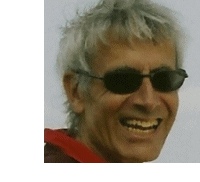 Dr Moti Nissani is a polymath. His restless mind ranges over many disciplines. He holds degrees in genetics, philosophy, and psychology. He left genetics in 1980, not wishing to carry out recombinant DNA research. Since then, his research and teaching defy specialization, involving such diverse fields as history, politics, media, science education, history of science, the greenhouse effect, and medicine. During the 1995-96 academic year, he served as a Fulbright Scholar at Tribhuvan University, Nepal and in 2000 served as an advisor to that university’s honors program. He also authored Lives in the Balance: The Cold War and American Politics, 1945-1991 (Hollowbrook Publishing, 1992). In 1932, the Spanish philosopher Ortega y Gassett wrote: “Previously, men could be divided simply into the learned and the ignorant, those more or less the one, and those more or less the other. But your specialist cannot be brought in under either of these two categories. He is not learned, for he is formally ignorant of all that does not enter into his specialty; but neither is he ignorant, because he is ‘a scientist,’ and ‘knows’ very well his own tiny portion of the universe. We shall have to say that he is a learned ignoramus, which is a very serious matter, as it implies that he is a person who is ignorant, not in the fashion of the ignorant man, but with all the petulance of one who is learned in his own special line.” Looking back, I realize now that I’ve been trying to avoid this modern curse of specialization all my life.
Dr Moti Nissani is a polymath. His restless mind ranges over many disciplines. He holds degrees in genetics, philosophy, and psychology. He left genetics in 1980, not wishing to carry out recombinant DNA research. Since then, his research and teaching defy specialization, involving such diverse fields as history, politics, media, science education, history of science, the greenhouse effect, and medicine. During the 1995-96 academic year, he served as a Fulbright Scholar at Tribhuvan University, Nepal and in 2000 served as an advisor to that university’s honors program. He also authored Lives in the Balance: The Cold War and American Politics, 1945-1991 (Hollowbrook Publishing, 1992). In 1932, the Spanish philosopher Ortega y Gassett wrote: “Previously, men could be divided simply into the learned and the ignorant, those more or less the one, and those more or less the other. But your specialist cannot be brought in under either of these two categories. He is not learned, for he is formally ignorant of all that does not enter into his specialty; but neither is he ignorant, because he is ‘a scientist,’ and ‘knows’ very well his own tiny portion of the universe. We shall have to say that he is a learned ignoramus, which is a very serious matter, as it implies that he is a person who is ignorant, not in the fashion of the ignorant man, but with all the petulance of one who is learned in his own special line.” Looking back, I realize now that I’ve been trying to avoid this modern curse of specialization all my life.
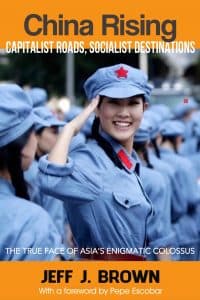 Getting to understand China (and Russia, too) is no idle matter. Buried under constant malicious propaganda, most Westerners, especially Americans, have no idea what is really going on in the world. China, the rising colossus, remains the most enigmatic and subject to distortion. Such mass ignorance can doom our planet, and block any possibility of political renewal, peace, and liberation, at home and abroad. With this much at stake, only truth can prevent a global catastrophe. Arm yourself with the facts by reading CHINA RISING, and do your part to keep greed and insanity from winning the day.
Getting to understand China (and Russia, too) is no idle matter. Buried under constant malicious propaganda, most Westerners, especially Americans, have no idea what is really going on in the world. China, the rising colossus, remains the most enigmatic and subject to distortion. Such mass ignorance can doom our planet, and block any possibility of political renewal, peace, and liberation, at home and abroad. With this much at stake, only truth can prevent a global catastrophe. Arm yourself with the facts by reading CHINA RISING, and do your part to keep greed and insanity from winning the day.
Buy China Rising today, and help spread the truth by filing your own review on Amazon, too! It’s a battle of communications we can’t afford to lose.
US $9.99, in Kindle edition.
Note to Commenters
Due to severe hacking attacks in the recent past that brought our site down for up to 11 days with considerable loss of circulation, we exercise extreme caution in the comments we publish, as the comment box has been one of the main arteries to inject malicious code. Because of that comments may not appear immediately, but rest assured that if you are a legitimate commenter your opinion will be published within 24 hours. If your comment fails to appear, and you wish to reach us directly, send us a mail at: editor@greanvillepost.com
We apologize for this inconvenience.
Nauseated by the
vile corporate media?
Had enough of their lies, escapism,
omissions and relentless manipulation?
Send a donation to
The Greanville Post–or
But be sure to support YOUR media.
If you don’t, who will?

Ending the “Drug War;” Solving the Drug Problem, The Public Health Approach, a new book by Steven Jonas, enters wide distribution. Outlines different, historically tested approach that does not rely on heavy policing, militarization and erosion of Constitutional rights.
The book is first being published as an e-book, by Punto Press Publishing of Brewster, NY, in April, 2016. A print edition is in development. This is a brief introduction to the book.
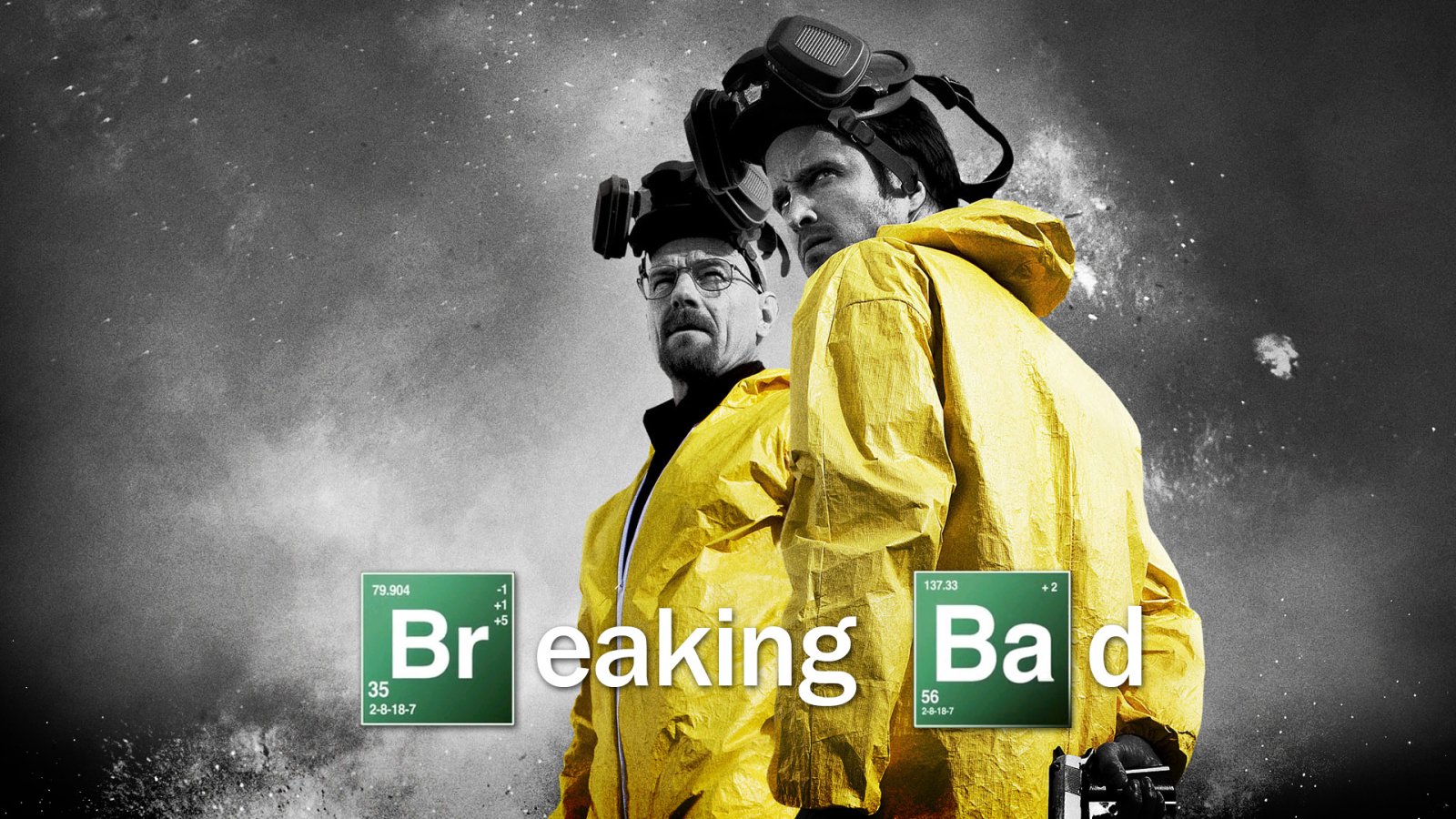
The deservedly praised tv series Breaking Bad drew its plotlines from the clash between the pervasive drug culture and the Feds, indiscriminately intent on stopping all offenders. It touched a deep chord in American society.
A word by the author
“Ending the Drug War.” That has been a rallying cry for drug policy reformers almost since the “Drug War,” aimed at the marijuana, heroin, and cocaine, was first declared by Richard M. Nixon in 1971. In fact there was a National Commission on Marijuana and Drug Abuse whose first report published in 1972 that recommended that marijuana be legalized. But the Nixon Administration would hear none of it. As a former top Nixon aide, John Haldeman, later told us, they wanted to “wage the war” for political, not health-improvement, purposes. And so the “Drug War” has proceeded unchecked for 45 years.
A basic premise of the “Drug War” is that there is a dichotomy among what I call the “Recreational Mood Alerting Drugs,” the RMADs. There are the “illicits,” primarily marijuana, heroin and cocaine, joined in more recent years by the “white heroin,” methamphetamine. And then there are the “licits,” primarily alcoholic beverages and tobacco products. While the latter are orders of magnitude more widely used and more harmful to the health of the nation than the illicits, the “Drug War” has managed to maintain that artificial dichotomy since its inception.
There has been a drug policy reform movement (DPRM) in place almost since the inception of the “Drug War” (which name is placed in quotation marks because it is not a war on the use of the RMADs, but rather only a war on certain users of certain RMADs). I became active in the DPRM in the late 80s and stayed with it into the mid-90s. I stayed with it until I realized that the bulk of the DPRM had a) bought into the artificial dichotomy created by the “Drug War,” b) was becoming more-and-more focused on the legalization of one of the illicits (of course that was marijuana) rather than dealing with the negative effects of all RMAD-use, and c) with the exception of Dr. Joyce Lowinson who in the 1990s published my work in the standard textbook Substance Abuse for which she was the Senior Editor, was not even interested in discussing my concepts, which became the “Public Health Approach to the Drug Problem.”
I fully agreed with all of the criticisms of the “Drug War” developed by the DPRM. It: a) has been totally ineffective in achieving its publicly stated objectives, b) has a racist basis that has become ever more apparent over the years, c) is enormously costly, d) has led directly to the problem of massive incarceration of minority young men, e) like Prohibition has created a large, very profitable, criminal enterprise which would otherwise not exist, and so on and so forth. BUT, I strongly disagreed with the increasingly narrow focus of the DPRM in how to go about dealing with the “Drug War,” which remains in place to this very day.
Even more strongly, as a public health physician I felt that if it were to be possible to effectively deal with the negative health outcomes of the use of the illicits, and there are such, one first had to deal with the much more widespread negative health effects of the use of the licits. Further, one had to recognize that it is the use of alcoholic beverages and tobacco products by children that directly leads, through the “Gateway Drug Effect,” not only to the use of those two RMADs by adults, but also to the use by teen-agers and adults of the illicits.
And so, I developed the principal focus of this book: the Public Health Approach to the Drug Problem (PHADP). It is spelled out in detail in chapter 5. The PHADP is based on five important principles: 1) the drug problem is a unity not a duality; 2) the United States has a broad-based Drug Culture (which includes not only the use of the RMADs themselves, but also how both pharmaceutical and over-the-counter drugs are promoted and sold as well as the promotion by state governments of a non-drug but highly addictive behavior, gambling) that will have to be dealt if the drug problem is to be brought under control; 3) RMAD-use, part of human culture apparently since there has been human culture, will never be eliminated, not should any attempt be made to do that; rather the focus should be on reducing the negative health effects of the use to the extent possible, using tried-and-true public health methods which have been shown to work (see below); 4) that at its base dealing with both the “Drug War” and the negative effects of RMAD-use are political/economic problems; 5) that there is a series of major Stakeholders in the maintenance of the “Drug War,” which, among others, range from certain political interests, through the currently licit RMAD industries, to the drug cartels themselves, which would have to be dealt with were the PHADP to be introduced and successfully implemented; and thus 6) along with its many negatives the “Drug War” actually interferes with solving the drug problem.
Finally, we have right in front of us in the United States an outstanding example of how the PHADP can be very successful, over time. That is of course, the United States’ Public Health Service’s National Anti-Smoking Campaign which has been in existence since the publication of the first Surgeon General’s Report on Smoking and Health in 1964. This, the most successful non-infectious disease control program ever implemented in the United States, has reduced the rate of adult smoking from 45% in 1964 to about 18% presently. And guess what? It did so without locking up even one cigarette smoker.
And so, this is what this book is about. Indeed, “Ending the Drug War; Solving the Drug Problem: The Public Health Approach”.
—Steven Jonas
MEDIA CONTACT AND AGENTS
The author is available for interviews, debates, discussions, and further writing. He may be reached through this site:
VIVIEN CONROY
Punto Press Publicity Coordinator
845-363-1687
vivienconroyvt@puntopress.com
or directly at Sjtpj@aol.com .
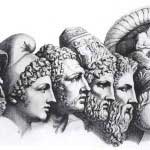
=By= Gaither Stewart
(Rome)
Hubris referred to actions that humiliated the victim for the pleasure of the abuser. In modern usage, hubris means extreme pride, a loss of contact with reality and an overestimation of one’s own capabilities, usually of persons in positions of power. Political writers apply it also to groups and in a special way to the United States of America and its leaders. Personally I try to avoid words which are being widely used, sometimes, it seems, at random. When I use the word hubris I have in mind the meaning of arrogance; in any case I intend a despicable quality.
Though ancient Greeks as a rule applied these dramatic words to the individual—Antigone’s flaw was her stubborn loyalty for which she paid with her life—we today apply these words also to entire societies or nations. We can label Europe’s hubris its Eurocentrism; its hamartia (for which the ancient Greeks would perhaps punish it collectively), is its destructive nationalisms on the one hand, and its contemporary subservience to America on the other. Continue reading »
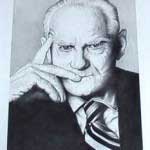
By Gaither Stewart
No more than you can choose the age in which you live, can you live without the age in which you are born; we are all children of our times … and to some degree consonant. The laws of the age of science and technology demand agreement if not homogeneity as a condition of existence: to work and exist means to collaborate within a system in which the actions of each are prescribed. Action is homogeneous when it conforms to the requirements of the system.
Nonetheless, the goals of the apparatus are not those of the individual. Personal conscience is easily reduced to conscientiousness in the execution of one’s duties from which is born the concept of conformist conscience. The result is the hegemony of “behavioral psychology of adaptation”—to be increasingly less oneself and more like everyone else. Technological society works against individuality—and for homogeneity. (The above is an adaptation from readings in Lionel Trilling’s Sincerity and Authenticity.)
Being different is not only non-remunerative but also arouses suspicion. The paradox is that authenticity—being oneself or knowing oneself, which wise men have long prescribed—in the conformist society becomes pathological behavior, as if being oneself were a disease. Continue reading »
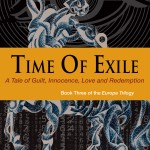
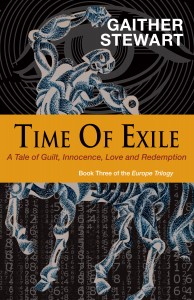 Time of Exile (TOE), the long awaited third and closing volume in Gaither Stewart’s Europa Trilogy was recently published by our Trepper & Katz imprint. Distribution is being carried out by Ingram/LSI, with Amazon as the chief domestic and international retailer. Robert Prudice is in charge of top tier market coordination.
Time of Exile (TOE), the long awaited third and closing volume in Gaither Stewart’s Europa Trilogy was recently published by our Trepper & Katz imprint. Distribution is being carried out by Ingram/LSI, with Amazon as the chief domestic and international retailer. Robert Prudice is in charge of top tier market coordination.
Like much of the Europa Trilogy, TOE is an absorbing novel whose narrative develops against the backdrop of a world dominated by the struggle between the Western “way of life”, soaked in American and political cultural values, and a world that refuses to adopt such an anti-humanist corporate template and chooses to build its own separate identity. Continue reading »




